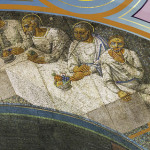We run our website the way we wished the whole internet worked: we provide high quality original content with no ads. We are funded solely by your direct support. Please consider supporting this project.
What is the significance of Ezekiel 12:1–3?
The Lord has Ezekiel symbolically enact Israel’s exile as a warning and remarks, “Perhaps they will understand, though they are a rebellious house” (vs. 3).
Though Israel repeatedly surprised God by their persistent rebellion, he nevertheless continued to hold out hope and thus to strive with them to participate in a covenant relationship with him. He thus gives Ezekiel an object lesson to carry out, hoping that “perhaps” this approach might succeed.
If everything about the future is settled and thus all future free decisions are certain to God, however, neither the “perhaps” of this verse nor the hope it is predicated on makes sense. God would have been completely certain all along that this object lesson was going to fail (because it did). Indeed, one wonders why the Lord would even waste Ezekiel’s time (while telling him he thinks it might work!) if he was absolutely certain it didn’t stand a chance.
In the open view of creation the verse is allowed to say what it seems to plainly say. God had Ezekiel go through this dramatic sermon because God genuinely thought it might work in bringing the people around to God. People are free, however, and unfortunately they sometimes used their freedom to thwart God’s plan for them.
Category: Q&A
Tags: Open Theism, Q&A
Topics: Open Theism
Verse: Ezekiel 12
Related Reading

God Clearly Can, So Why Doesn’t He? (podcast)
Leah expects more from God. Should she? Greg confronts God’s inactivity and underperformance. Episode 510 http://traffic.libsyn.com/askgregboyd/Episode_0510.mp3

Paradigm Shift Questions
A couple that was recently introduced to ReKnew and several of my books recently wrote to tell me that they are in the process of embracing the warfare worldview along with the open view of the future. They said that they “realize that these things aren’t minor adjustments but are rather all-encompassing paradigm shifts in…

What is the difference between “libertarian” and “compatibilistic” freedom?
Question: I often hear philosophers and theologians talk about “libertarian” and “compatibilistic” freedom. What do these terms mean? Answer: A person who holds to “libertarian” freedom believes that an agent (human or angelic) is truly free and morally responsible for their choices only if it resides in an agent’s power to determine his or her own choices. Their…

5 Ways the Bible Supports Open Theism
Open Theism refers to the belief that God created a world in which possibilities are real. It contrasts with Classical Theism which holds that all the facts of world history are eternally settled, either by God willing them so (as in Calvinism) or simply in God’s knowledge (as in Arminianism). Open Theists believe God created humans and…

The Open View of Messianic Prophesies
Image by Lawrence OP via Flickr A number of passages speak of particular events being foreknown by God, even events resulting from individuals’ free will. For example, dozens of prophesies in the OT accurately predict details about the coming Messiah (e.g., he would be born in Bethlehem; arise out of the lineage of Abraham; be executed with…

Living Into the Future
Why didn’t God create a “perfect world”? Here’s Greg’s response to that question. See more at The Work of the People.
